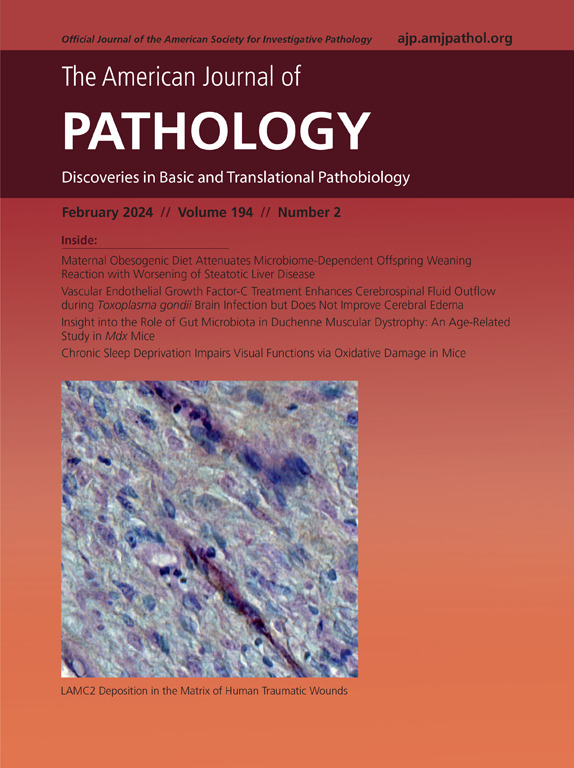Machine Learning and Mendelian Randomization Reveal a Tumor Immune Cell Profile for Predicting Bladder Cancer Risk and Immunotherapy Outcomes
IF 4.7
2区 医学
Q1 PATHOLOGY
引用次数: 0
Abstract
This study’s objective was to develop predictive models for bladder cancer (BLCA) using tumor infiltrated immune cell (TIIC)-related genes. Multiple RNA expression data and scRNA-seq were downloaded from the TCGA and GEO databases. A tissue specificity index was calculated and a computational framework developed to identify TIIC signature scores based on three algorithms. Univariate Cox analysis was performed, and the TIIC-related model was generated by 20 machine learning algorithms. A significant correlation between TIIC signature score and survival status, tumor stage, and TNM staging system was found. Patients in the high-score BLCA group had more favorable survival outcomes and enhanced response to PD-L1 immunotherapy as compared to those in the low-score group. This TIIC model showed better performance in prognosing BLCA. Diverse frequencies of mutations were observed in human chromosomes across groups categorized by TIIC score. No statistically significant correlation was observed between noncancerous bladder conditions and BLCA when examining the single nucleotide polymorphisms (SNPs) associated with the genes in the prognostic model. However, a statistically significant association was found at the SNP sites of rs3763840. There was no significant association between bladder stones and BLCA, but there was a significant association on the SNP sites of rs3763840. A novel TIIC signature score was constructed for the prognosis and immunotherapy for BLCA, which offers direction for predicting overall survival of patients with BLCA.
机器学习和孟德尔随机化揭示了预测膀胱癌风险和免疫治疗结果的肿瘤免疫细胞谱。
本研究旨在利用肿瘤浸润免疫细胞(TIIC)相关基因建立膀胱癌(BLCA)的预测模型。我们从 TCGA 和 GEO 数据库下载了多种 RNA 表达数据和 scRNA-seq。我们计算了组织特异性指数(TSI),并开发了一个计算框架,根据三种算法确定TIIC特征得分。我们进行了单变量 Cox 分析,并通过 20 种机器学习算法生成了 TIIC 相关模型。结果发现,TIIC特征得分与生存状况、肿瘤分期和TNM分期系统之间存在明显的相关性。高分组BLCA患者的生存率更高,对PD-L1免疫疗法的反应更强。我们的TIIC模型在预测BLCA预后方面表现更佳。在按TIIC评分划分的不同组别中,人类染色体的突变频率各不相同。在研究预后模型中与基因相关的 SNPs 时,未发现非癌症膀胱状况与膀胱癌之间存在统计学意义上的显著相关性。不过,在 rs3763840 的 SNP 位点上发现了统计学意义上的显著关联。膀胱结石与膀胱癌之间没有明显关联,但在 rs3763840 的 SNP 位点上存在明显关联。总之,我们为膀胱癌的预后和免疫治疗构建了一个新的TIIC特征评分,为预测膀胱癌患者的OS提供了方向。
本文章由计算机程序翻译,如有差异,请以英文原文为准。
求助全文
约1分钟内获得全文
求助全文
来源期刊
CiteScore
11.40
自引率
0.00%
发文量
178
审稿时长
30 days
期刊介绍:
The American Journal of Pathology, official journal of the American Society for Investigative Pathology, published by Elsevier, Inc., seeks high-quality original research reports, reviews, and commentaries related to the molecular and cellular basis of disease. The editors will consider basic, translational, and clinical investigations that directly address mechanisms of pathogenesis or provide a foundation for future mechanistic inquiries. Examples of such foundational investigations include data mining, identification of biomarkers, molecular pathology, and discovery research. Foundational studies that incorporate deep learning and artificial intelligence are also welcome. High priority is given to studies of human disease and relevant experimental models using molecular, cellular, and organismal approaches.

 求助内容:
求助内容: 应助结果提醒方式:
应助结果提醒方式:


